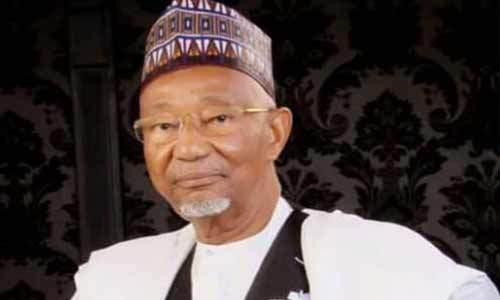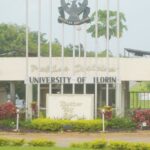
IF there was any doubt about the endemic corruption assailing the Nigerian judiciary, Adamu Bulkachuwa, who represented Bauchi North in the Ninth Senate, has just dispelled it. His valedictory speech suggested that he may have influenced his wife, Zainab, a former president of the Court of Appeal, in “helping” lawmakers in their positions. To many Nigerians, it reinforced the widely held belief that the judiciary has been captured and is in urgent need of redemption.
During the valedictory session of the Ninth Senate, the senator implied that he influenced the decisions of his wife in her judicial duties. To those listening and to the entire world viewing the presentation that has since gone viral, the lawmaker expressly hinted that the judge may have used her position to favour his colleagues in the Senate.
A visibly embarrassed Ahmad Lawan, presiding for the last time as Senate President, hushed up the elderly senator, saying his comments (read confession) were not appropriate for that forum. He succeeded only at the third try. Days after, Bulkachuwa has tried to walk back on his words. He now says he was misunderstood, and blamed Lawan for not allowing him to fully articulate his thoughts.
Zainab, the first female to hold the Court of Appeal Presidency, presided over the 2007 Sokoto State governorship election petition tribunal; and chaired the 2019 Presidential Election Petition Tribunal before she recused herself after Atiku Abubakar, the Peoples Democratic Party flagbearer questioned her impartiality on the grounds that her husband is a prominent All Progressives Congress member and senator. The jurist, after an illustrious career, has defended herself, saying that she never favoured any party during her service.
“I look at faces in this chamber who have come to me and sought my help when my wife was the President of the Court of Appeal. And I must thank particularly, my wife, whose freedom and independence I encroached upon while she was in office, and she has been very tolerant and accepted my encroachment, and extended her help to my colleagues,” said Bulkachuwa.
The Nigerian Bar Association has called for the probe and arrest of the lawmaker and his wife. It should not relent until concrete action is taken. Indeed, Nigerians have become deeply disillusioned with the judiciary. They are aghast at the several illogical, sometimes contradictory judgements handed down by the higher courts. A case in point was the ruling on the Yobe North Senatorial District ticket tussle.
Whereas Bashir Machina emerged in May 2022 as the APC candidate at the party primaries monitored by the Independent National Electoral Commission, Lawan, who occupied the seat sought and lost the ticket of the party for the presidency. Yet, on February 6, 2023, the Supreme Court ruled that Lawan, who did not participate in the senatorial primary election, was the APC’s candidate for the senate seat.
The highest court voided the judgements of the Federal High Court and the Court of Appeal, which had both affirmed Machina as the rightful candidate, having won the party primaries unopposed. The court’s majority hinged its decision on a procedural technicality.
In another baffling judgement, the Supreme Court upheld an appeal filed by Godswill Akpabio, who had also contested the APC presidential primaries, challenging the Court of Appeal judgement that nullified his candidacy for the Akwa Ibom North-West Senatorial District election. The apex court held that the appellate court lacked the jurisdiction to meddle in the nomination of candidate for an election, which it said was an internal party affair. Instructively, the Court of Appeal had held that Akpabio, having contested the presidential primaries of the APC, could not also participate in the valid senatorial primaries of the party.
But perhaps most offensive to public sensitivity, the highest court in January 2020 declared Hope Uzodimma as the winner of the Imo State governorship election despite coming fourth in the 2019 polls. The state has not known peace since that controversial judgement.
But judicial mysteries are not new in Nigeria. In March 2008, Federal High Court judge, Ibrahim Buba, the granted an order of perpetual injunction restraining the Economic and Financial Crimes Commission from investigating or prosecuting Peter Odili after his tenure as Rivers State governor between 1999 and 2007. These judgements and other actions have dented the reputation of judiciary nationally and globally. Beyond setting up probe panels, the National Judicial Council must take drastic disciplinary action against errant judicial officers to regain public trust.
Referred to as the last hope of the citizenry, and the third arm of the realm, an impartial and resilient judiciary is the last guardrail in a democracy. A paper prepared for the UNODC declares that the “Integrity of the judiciary is of vital importance to the society. The integrity of a judge should be without a shadow of a doubt.”
The United Kingdom Supreme Court, from where Nigeria borrowed its legal system, reaffirmed this at a session in 2017, “Individually, a judge must also be both honest and incorruptible and independent of the parties and issues before him.”
A corrupt judicial system is a symptom of a fragile state because corruption undermines all institutions. In Nigeria, there is pervasive impunity and endemic corruption in the justice sector, including misapplication of legal instruments, dubious plea bargaining and interlocutory orders, and excessive delays determining cases. The NJC should come down hard on judges who undermine the law with reckless ex parte orders. They should be prosecuted and kicked out of the system. The NBA should also cleanse its ranks of lawyers who allegedly facilitate bribes to judges.
The fight against corruption in Nigeria has failed due to lack of complementary support from the judiciary. The Chief Justice of Nigeria, Olukayode Ariwoola, who also chairs the NJC, should resolve to rid the bench of corruption. The recent passage of a law granting financial autonomy to the judiciary is a welcome step. Bulkachuwa’s divulgence should not be swept under the carpet. All hands should be on deck to excise corruption from the bench and restore the dignity of the judiciary.





